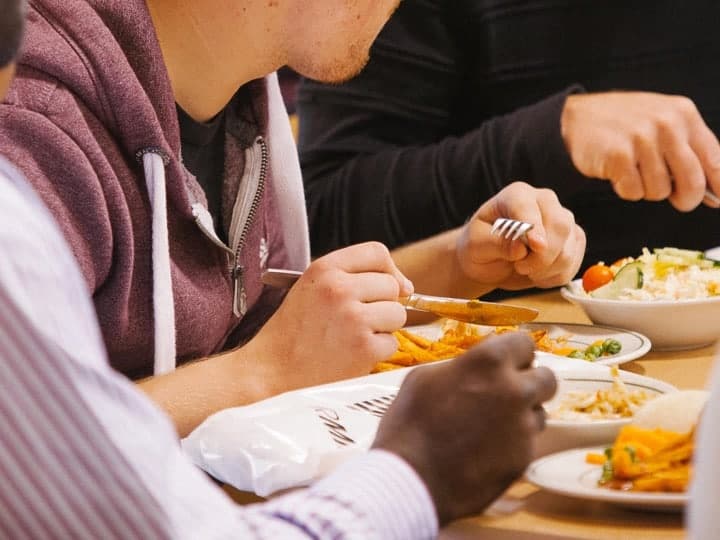
I’ve always enjoyed eating as part of church life. I’ve mostly viewed it as a social activity, which is inclusive and easy to invite people to, but recently I’ve been thinking about eating together as a missional activity. In one of her books on Messy Church, Lucy Moore asks “Why is it strange for most churches to eat together … Why is [a meal like] the Alpha supper still an exception to the run of church life, rather than the rule?” (2009, p. 62). In my experience, eating together has normally been an occasional, rather than a regular thing.
In 2017 I supervised an undergraduate student dissertation investigating ways that a monocultural church can become a multicultural church. One of her findings was that eating multicultural meals together is essential to developing multicultural church. In 2018 I supervised an undergraduate student dissertation investigating ways that Brazilian missionaries in the UK can be more effective in engaging with non-Brazilians. Similarly, one of the findings was that hospitality, and especially eating together is key to engaging interculturally. The experience of supervising these students has made me realise two things.
Firstly, eating together can have a missional function in church. Providing food is a form of hospitality, and it can enable new people to be welcomed, as well enabling new people to engage. In my own life I have experienced this recently at Messy Church in my local community in Northfield, Birmingham. This is the first time that I have experienced regular meals at a British church. We hold Messy Church at the end of each month, and lunch is an essential part of it. Moore, founder of Messy Church, has devoted a chapter of one her Messy Church books to food. She affirms that eating together is “one of the main aspects of Messy Church that gives it identity” (2009, p. 57). There are number of Messy Church resources that are very practical in nature, but this chapter (Moore, 2009, pp. 50-67) contains some useful theological reflections on food and hospitality especially using Luke’s Gospel and an episode in the lives of Abraham and Sarah (Gen. 18). In particular, I like Moore’s observations that a meal can be a gift because “[n]o one has to earn the right to a meal by taking a course or passing an exam” (2009, p. 60).
Secondly, as well as having a missional function, eating together can enable intercultural fellowship and mission. When I was a student, I experienced a small multinational church in London where everyone ate together every time the church met. Food was provided after every service, and the couple that hosted midweek meetings in their apartment provided a lavish feast before every meeting. It was quite an experience and I got to try several things that I had not eaten before. People from that church also ate out together frequently and I experienced eating some traditional Chinese food at Chinese New Year, although I was not brave enough to try the chicken’s feet that were on offer. The importance of eating together in forming intercultural partnerships is also noted by Andy Hardy and Dan Yarnell who suggest the “importance of expressing a willingness to embrace [another] culture by sharing their food” (2015, p. 182). Hardy goes on to tell the story of eating Nigerian food, and he (unlike me) was brave enough to eat fish-head soup, when forming partnerships with Nigerian believers.
So, what role does eating together play in your church? I’ve become convinced that eating together enables meaningful fellowship, enables people to be welcomed into church, and can facilitate intercultural fellowship and partnerships. It is also an essential activity in mission. If eating together does not happen in your church, what can you do to change things? Organising a meal can involve lots of effort, but as Moore suggests, the effort is worth it because eating together is “so precious” (p. 50).
Peter Cooper is a lecturer and undergraduate programme administrator for ForMission.
You can find out more about Messy Church at: https://www.messychurch.org.uk/
Bibliography
Hardy, A. and Yarnell, D. (2015) Forming Multicultural Partnerships: Church Planting in a Divided Society. Watford: Instant Apostle.
Moore, Lucy. (2009) Messy Church 2: Ideas for discipling a Christ-centred community. Abingdon: The Bible Reading Fellowship.

